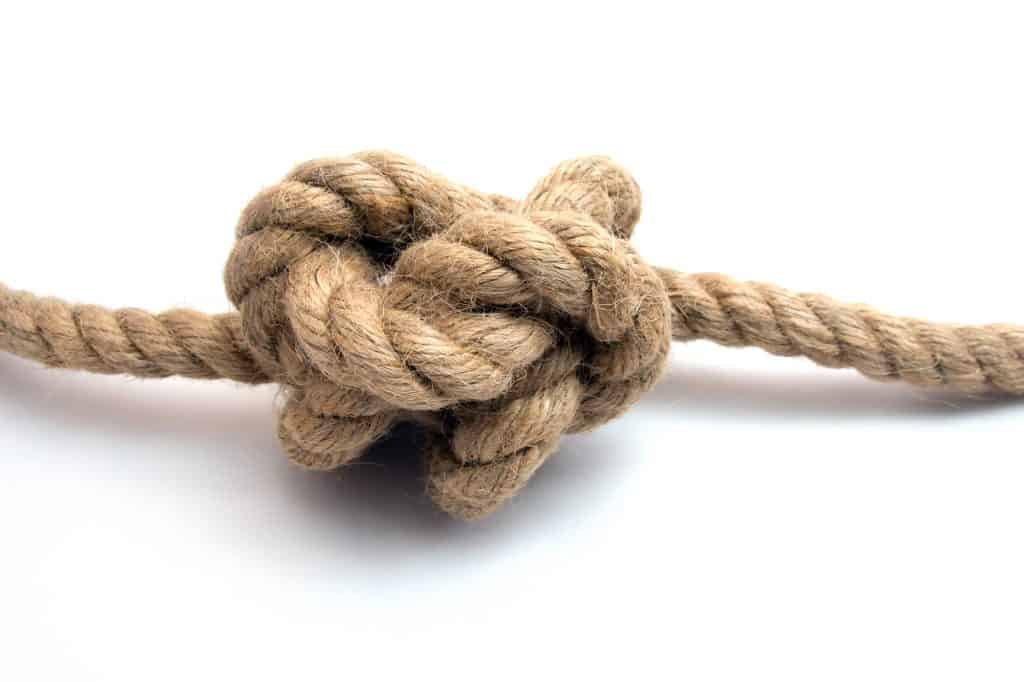
Magnet fishers need to master a handful of high-quality knots to ensure that they don’t lose their gear.
The following three knots are the best for magnet fishing and suitable for multiple purposes.
Top 3 Best Knots For Magnet Fishing
The Double Figure Eight Knot
The double figure eight knot is likely the most popular choice for magnet fishers.
This knot provides you with a multitude of benefits and only a handful of drawbacks.
How to Tie This Knot
The tying process for this knot is among the simplest on this list and includes the following steps:
- 1. Pull one end of your rope along the other to pair them up and then adjust the length of each strand until they are equal.
- 2. Pull the end curve of the rope beneath the main two strains of the rope and pull it up to create a loop.
- 3. Pull the curved end of the rope through the loop to create a figure eight. You can stop here if you want a single figure eight.
- 4. Pull the curved end of the rope back through the figure eight that you just made, going beneath the main strands of the loop.
- 5. Open the end of the top strand of the loop and take it through the remaining strands of the curved end you just pulled through the figure eight.
- 6. Pull that same end of the rope to the right to give it some room for when you tighten up the knot at the end of the process.
- 7. Hold the left end of the knit and pull the top loop to tighten the knot. If you finish properly, the knot will resemble bunny ears.
Seeing exactly which strands to pull and where to take them should make tying the knot much easier for you.
Advantages
The benefits of the double figure eight knot include how it is:
- Easy to tie once you master the basic steps
- A straight loop that makes the knot stronger
- Designed for maximum strength for your magnet fishing
- Nearly impossible to shake loose in water
Disadvantages
Though the double figure eight knot works well for magnet fishers, it has disadvantages, including how it:
- It May be hard to untie if you’re not used to knots
- Could tangle up during the knotting process
Other Uses of the Knot
The double figure eight knot is a popular choice for a multitude of purposes, including how it is:
- Useful for creating a simple seat
- Great for anchor lines and other uses
- Well suited for bracelets and other jewelry
- Perfectly adapted for rock climbers
The Anchor Hitch Knot
Any fisher has likely mastered this simple knot years ago, as the anchor hit is useful for anchors and other uses.
Magnet fishers should, therefore, master it as soon as possible for their favorite hobby.
Thankfully, most should be able to handle it with little difficulty.
How to Tie This Knot
- 1. Pull the rope through your carabiner hook, wrap it around the top of the hook, and then pull it through the loop again.
- 2. Take this end of the line around the back of the main strand of rope and then pull it through the two loops you just made.
- 3. Pull the rope taut and then wrap it around the remaining rope again, pulling it through the loop you just made.
- 4. Tug the knot tightly to finish up, though you can also take the loose end of the remaining rope and pull it through the knot again.
This simple process makes the anchor hitch a knot that you shouldn’t have to practice too often.
While the double figure eight is also fairly simple, the anchor hitch is likely the easiest one to tie on this list.
Advantages
Magnet fishers interested in this knot should understand why it is so beneficial for their hobby.
Benefits include how it is:
- Very easy to tie
- Adaptable to other knots, including the half hitch
- Strong enough for multiple situations
Disadvantages
The following concerns should all be considered before you try mastering this knot:
- May not hold as much weight as other knots
- Could slip more easily
Other Uses of the Knot
When you master this knot, you can utilize it in a variety of other ways, including:
- Tying anchors to ropes while fishing
- Attaching carabiners to climbing ropes
- Climbing trees more easily
- Tying boats down quickly during a long trip
Uni Knot
This knot, otherwise known as the hangman’s noose, is adaptable for many magnet fishing situations.
Though this choice may be the most difficult to tie on the list, it does provide a sturdy and reliable knot that is unlikely to give out on you.
How to Tie This Knot
Although the uni knot has relatively few steps compared to other knots on this list, you will need to practice this process a few times to get it right.
Tying a uni knot requires you to:
- 1. Create a figure eight by pinching your rope following the method outlined on this site. Hold the pivot point of the knot to keep it tight.
- 2. Pull the loose end of the rope to the left, behind the other loop, and wrap it several times around the pivot point to hold it tightly.
- 3. Wrap the rope in this way around the main strand three more times to start creating the trademark hangman’s noose look. Wrap three more times to make it as tight as possible.
- 4. Pull the end of the rope through the small remaining end of the starting loop and pull the lower loop to tighten the rope around this end.
Advantages
Magnet fishers interested in this knot should understand why it is so beneficial for their hobby.
Benefits include how it:
- Creates the tightest knot of any on this list
- Can be easily adjusted to increase strength
- Simple to loosen with a little work
Disadvantages
Though the uni knot is likely the strongest of all the knots on this list, it creates many unique challenges, including how it:
- It may be harder for some people to tie
- Could take work to properly loosen
Other Uses of the Knot
Mastering the uni knot is a great idea because you can use this knot in many other ways, including:
- Tying lures to your fishing line
- Holding a boat down to a dock
- Keeping something tied down to a vehicle
- Holding garbage bags shut during transportation
Conclusion
Practice these knots several times before you go magnet fishing to ensure that you do them right.
Once you can tie these knots without any difficulty, you can go out magnet fishing and catch some great treasures.

